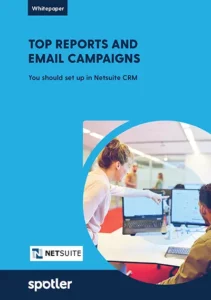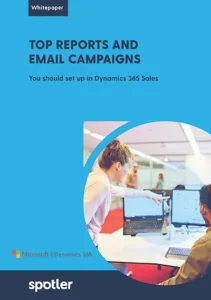At Spotler, we’d be lost without Spotler CRM. It sits at the heart of Spotler Suite, storing the traffic to our website, the responses to our email campaigns and the engagement with our social media posts.
And yet CRM adoption is not universal; depending on who you ask, somewhere between 9% and 15% of businesses with more than 10 employees don’t use a CRM. Why not?
We’ve identified 6 common reasons for not adopting a CRM. Some are rational, or at least understandable. Some are… not.
Good Reason: Lack of Objectives
CRM is powerful when you deploy it properly, but just jamming it into your tech stack and hoping for the best would be a very expensive mistake.
Like all software investments, you’re shouldering an upfront cost because of the way it will pay off in increased efficiency and revenue down the road. But without clear objectives those benefits will be much slower in coming, or even may not come at all.
We like to talk about “the leaky bucket”; where you have plenty of leads entering the top of your funnel, but not enough revenue coming out of the bottom. The overview provided by a CRM will help you identify exactly where the leak is. If only 4% of initial leads ever make it any further down, then you’re going after the wrong people early on. If 100% of them make it three-quarters of the way down, but only 7% become new customers, then you need to examine how you’re nurturing that early interest. Without this detailed view, you’re sticking patches in random places and hoping for the best.
Bad Reason: Cost
It seems like “doing more with less” has been the mantra for businesses for the whole 21st century so far. The way to deal with cost-based objections is to refer back to the objectives a CRM would help you to fulfil. When you work out where to plug the leaks (see above) so that twice as many of your warm leads convert to paying customers, the cost of a CRM will look like a bargain.
And according to research by Nucleus Research, the average return on investment (ROI) from buying a CRM system is around £2.50 for every pound spent; meaning for every pound invested in a CRM, a business can expect to see a return of £2.50 in sales revenue.

Good Reason: Poor data quality
“Garbage in, garbage out.”
The best CRM in the world won’t be of much use to you if the data you feed into it is no good. You’ll just end up sending sales messages to the wrong target audiences, with their names incorrect or just blank. We’ve had far more negative feedback to emails that were personalised incorrectly than to those with no personalised elements at all.
While it’s critical that the first upload of data into your new CRM is accurate, data management has to be an ongoing process. Around 5% of your data per year will become inaccurate as people change jobs, and companies change software, locations or owners. You should spot this through the results of your marketing campaigns, as existing contacts stop engaging or become hard bounces, and new contacts and organisations appear in your list of website visitors.
Bad Reason: Internal Resistance
“A body remains at rest, or in motion at a constant speed in a straight line, except insofar as it is acted upon by a force.”
– Newton’s First Law of Motion
People tend to like things the way they are. This is especially true of multi-step processes like sales funnel, and processes that are working fine most of all.
The problem is that “processes that are working fine” are probably leaving money on the table. Without the sort of joined-up view that a CRM provides, you might not notice that that new website visitor is actually from the US branch of a company whose UK branch is already your customer. So you miss the chance to show off the success that you’ve delivered for their existing colleagues, which would be the most persuasive case study imaginable!

Good Reason: Internal Resistance
Yep, this one’s a double-edged sword!
It’s important to understand the cause of internal resistance. If it’s “I like things how they are” or “I’m too busy selling to learn a new system” then refer to the previous paragraph.
However, if you’ve gone about the selection process wrong, you may find resistance in the form of “this won’t do [x thing] that we really need” or “it makes [x process] take longer with no better results”.
The way to avoid this is to get all the relevant people involved early; what do the teams who would use the new CRM actually need and want from it? How will training be delivered? Will there be a phased introduction or a set date where everything changes?
Bad Reason: “Our customers don’t want to be tracked”
What kind of data we share as consumers, how much we share, and who we share it with are all valid concerns as more and more activity becomes digital.
However, Forbes’ State of Customer Service & CX survey found that 70% of respondents thought it was important for companies to tailor their experience to their past purchases. The key here is the difference between 1st party and 3rd party tracking. If I’ve browsed a website for tennis shoes, I’m not going to be annoyed if I get an email from that company when they have a sale on tennis shoes. If I’ve posted a selfie from a tennis court, and a company I’ve never shopped with then emails “nice pic! How about some new tennis shoes?”, that’s a very different story.
As long as you only use a CRM to hold data relevant to your direct relationship with your customer, then you’re treading the right line between effective personalisation and stalking.
What’s stopping YOU?
Do these arguments sound familiar? There’s no doubt that a CRM system is a significant investment which it’s important to get right.
We fully believe that the advantages of managing your data in a CRM outweigh the potential issues. That’s why when you invest in Spotler CRM, you get onboarding and support from Day 1 to make it a success for your objectives. Ready to take the next step? It starts with a 1-to-1 demo.




